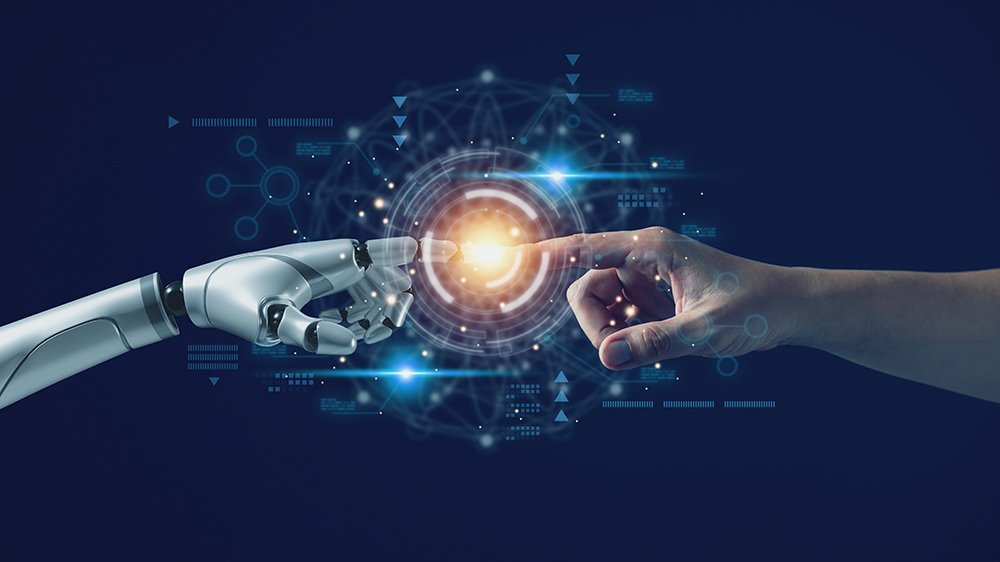AI is an opportunity to make business more human

John E. Kaye
- Published
- Artificial Intelligence, Technology

Entrepreneur investor and psychotherapist Professor Michael Atar calls upon business leaders and professionals to embrace the future of artificial intelligence rather than fear it.
By Professor Michael Atar
As an entrepreneur and med-tech investor, I understand the anxiety that often accompanies technological advancements. Any big leap forward is inevitably disruptive to businesses until they learn to acclimatise, and artificial intelligence perhaps represents the greatest leap since the dawn of the digital age.
And as a psychotherapist, I appreciate why we, as professionals, may be fearful of AI, perceiving it as an existential threat to our livelihoods. Indeed, research suggests that nearly half of professionals harbour such fears, with deep concerns about their future job security.
This is entirely natural. Historically, every major technological breakthrough has been met with similar waves of anxiety. When the television was introduced, people questioned how it would change society. The same was true when mobile phones and the internet came along.
But at the same time I feel that we may be looking at the future of AI through the wrong end of a telescope. Yes, the unknown can be daunting, especially when it concerns something as powerful as AI, but we risk forgetting that we have the agency to shape it into what we would like it to become.
Rather than allowing it to transform into our most dangerous competition, with the right foresight it could, instead, become our most valued companion.
It may seem paradoxical but I truly believe that AI is a unique opportunity for every business leader to make their company and services more, not less, human, with the associated benefits to customers, staff, and the bottom line. Let me explain.
The Industrial Revolution Shows Us The Way
Take a moment to consider the Industrial Revolution. When it began in the late 18th century, many feared it would lead to widespread job losses and societal collapse.
In reality, while certain jobs did disappear— because human power simply could not match machine power—new ones emerged that were more complex, more creative, and more rewarding.
In a sense, the Industrial Revolution acted as a filter, separating the purely mechanical from the truly human and reassigning duties accordingly while generating a wealth of new sectors and specialisms that simply did not exist before.
The same thing will happen with AI. The conversation today is heavily focused on the fear of machines taking over jobs but the truth it doesn’t have to replace workers—it can augment their abilities, free them from mundane tasks, and empower them to focus on higher-level, more meaningful, and stimulating work which amplifies a company’s strengths and drives further innovation.
The Power of AI to Enhance, Not Replace, Human Roles
In short, AI isn’t here to replace the human touch but to enhance it. This is where the opportunity lies for businesses today.
In many industries, employees are bogged down by repetitive tasks—tasks that consume time and energy but add little to the strategic value that human minds bring to the table. By automating these tasks, AI can help businesses free up their human resources for more meaningful and engaging work, requiring empathy, intuition, and creative thinking.
For instance, AI-powered robots in care homes can help address staffing shortages, allowing human caregivers to focus on emotional support and quality interactions with patients. AI can handle tasks like feeding or monitoring, while humans can provide the compassion and personal touch that machines cannot replicate.
In industries like retail, logistics, or customer service, meanwhile, AI can handle routine tasks like scheduling, inventory management, or responding to basic customer enquiries.
In whatever sector it is sensibly deployed, AI will make the workplace more human-centred than ever, allowing employees to focus on what they do best: building positive relationships with clients.

Entrepreneur investor Professor Michael Atar says rather than fear AI, we should see it as an exciting opportunity to make businesses more human and rewarding for employees and customers alike.
Rethinking Jobs and Creating New Roles
While job displacement is one of the most common fears surrounding AI, we can’t close our eyes to it or resign ourselves to this possibility. Our active involvement is required to mitigate the impact of the transition that it coming, and key to this is being bold in reimagining what work looks like in an AI-powered world.
Instead of fearing job loss, employees can be equipped with the skills needed to manage, adapt, and innovate with AI. This could involve training on how to use AI systems, maintain the technology, or apply AI insights in their work. It’s about creating an environment where technology and humanity work hand-in-hand to improve lives.
Take a public space such as a park. While AI can automate the physical tasks such as mowing the lawns and clearing litter, the human staff can still have purpose by being retrained to oversee and maintain the machinery.
At the same time, with appropriate training, workers can focus on the aspects of their roles that require those prized mental assets that set us apart from machines, such as emotional intelligence and communication skills—all of which are essential to fostering strong relationships and improving workplace culture, and which enhance job satisfaction by creating more fulfilling roles that align with human strengths.
Staff can have more time to engage with visitors, providing valuable and appreciated services such as answering questions and offering assistance, while also supporting their colleagues. Every employee has, in effect, the opportunity to become the perfect ambassador for your business.
The same principle could apply in stores and supermarkets, in museums and art galleries, in manufacturing companies, fitness centres, and on and on. And the beauty is that as AI systems become more sophisticated, the demand for workers who can understand, manage, and innovate with these technologies—and at the same time maintaining a human presence for companies—will grow exponentially.
By rethinking how we design roles and leverage AI, businesses can deliver a new normal that benefits us all.
A Human-Centred Future Powered by AI
Ultimately, the question of whether AI is a danger depend upon who is dealing with it. If we have money and profit foremost in our minds then yes, it is a threat to many, But if we instead focus on how AI can bring us together and enhance the human experience then, for the same cost, we can reap huge benefits for all.
Fundamentally, we must try to keep in our mind that AI’s role in business is not to replace human workers but to enable them to do their best work. Utilised correctly, it will empower us to be more human again—offering better customer service, creating more innovative products, and building businesses that not only succeed financially but also add real value to society.
In the end, complaining about AI or trying to resist it won’t change anything. The AI revolution is approaching regardless. The only way forward is to harness its potential and ensure it’s aligned with the values we hold dear.
I hope to see a future where AI and humans work in harmony, but it’s up to us as entrepreneurs, leaders, and professionals to embrace this opportunity, steer the conversation and shape the tomorrow we want to see, not the one we dread.
And that, to me, is the most exciting opportunity of all.
For more information about Professor Michael Atar, visit www.michael-atar.com
RECENT ARTICLES
-
 AI-driven phishing surges 204% as firms face a malicious email every 19 seconds
AI-driven phishing surges 204% as firms face a malicious email every 19 seconds -
 Deepfake celebrity ads drive new wave of investment scams
Deepfake celebrity ads drive new wave of investment scams -
 Europe eyes Australia-style social media crackdown for children
Europe eyes Australia-style social media crackdown for children -
 Europe opens NanoIC pilot line to design the computer chips of the 2030s
Europe opens NanoIC pilot line to design the computer chips of the 2030s -
 Building the materials of tomorrow one atom at a time: fiction or reality?
Building the materials of tomorrow one atom at a time: fiction or reality? -
 Universe ‘should be thicker than this’, say scientists after biggest sky survey ever
Universe ‘should be thicker than this’, say scientists after biggest sky survey ever -
 Lasers finally unlock mystery of Charles Darwin’s specimen jars
Lasers finally unlock mystery of Charles Darwin’s specimen jars -
 Women, science and the price of integrity
Women, science and the price of integrity -
 Meet the AI-powered robot that can sort, load and run your laundry on its own
Meet the AI-powered robot that can sort, load and run your laundry on its own -
 UK organisations still falling short on GDPR compliance, benchmark report finds
UK organisations still falling short on GDPR compliance, benchmark report finds -
 A practical playbook for securing mission-critical information
A practical playbook for securing mission-critical information -
 Cracking open the black box: why AI-powered cybersecurity still needs human eyes
Cracking open the black box: why AI-powered cybersecurity still needs human eyes -
 Tech addiction: the hidden cybersecurity threat
Tech addiction: the hidden cybersecurity threat -
 Parliament invites cyber experts to give evidence on new UK cyber security bill
Parliament invites cyber experts to give evidence on new UK cyber security bill -
 ISF warns geopolitics will be the defining cybersecurity risk of 2026
ISF warns geopolitics will be the defining cybersecurity risk of 2026 -
 AI boom triggers new wave of data-centre investment across Europe
AI boom triggers new wave of data-centre investment across Europe -
 Make boards legally liable for cyber attacks, security chief warns
Make boards legally liable for cyber attacks, security chief warns -
 AI innovation linked to a shrinking share of income for European workers
AI innovation linked to a shrinking share of income for European workers -
 Europe emphasises AI governance as North America moves faster towards autonomy, Digitate research shows
Europe emphasises AI governance as North America moves faster towards autonomy, Digitate research shows -
 Surgeons just changed medicine forever using hotel internet connection
Surgeons just changed medicine forever using hotel internet connection -
 Curium’s expansion into transformative therapy offers fresh hope against cancer
Curium’s expansion into transformative therapy offers fresh hope against cancer -
 What to consider before going all in on AI-driven email security
What to consider before going all in on AI-driven email security -
 GrayMatter Robotics opens 100,000-sq-ft AI robotics innovation centre in California
GrayMatter Robotics opens 100,000-sq-ft AI robotics innovation centre in California -
 The silent deal-killer: why cyber due diligence is non-negotiable in M&As
The silent deal-killer: why cyber due diligence is non-negotiable in M&As -
 South African students develop tech concept to tackle hunger using AI and blockchain
South African students develop tech concept to tackle hunger using AI and blockchain



























